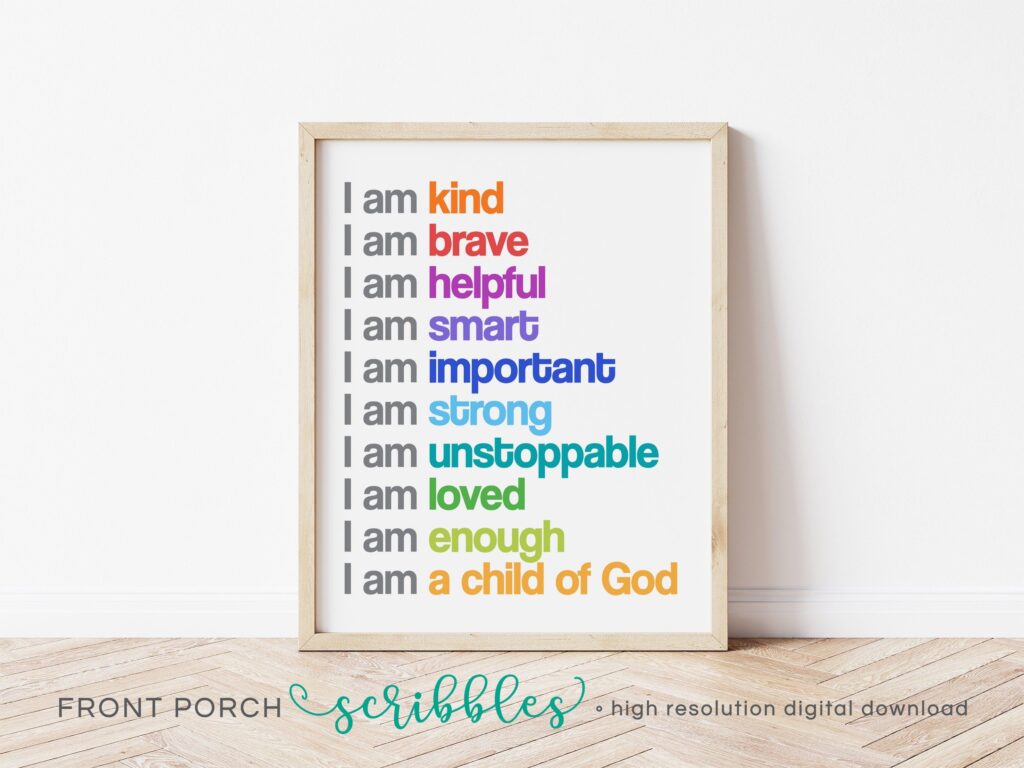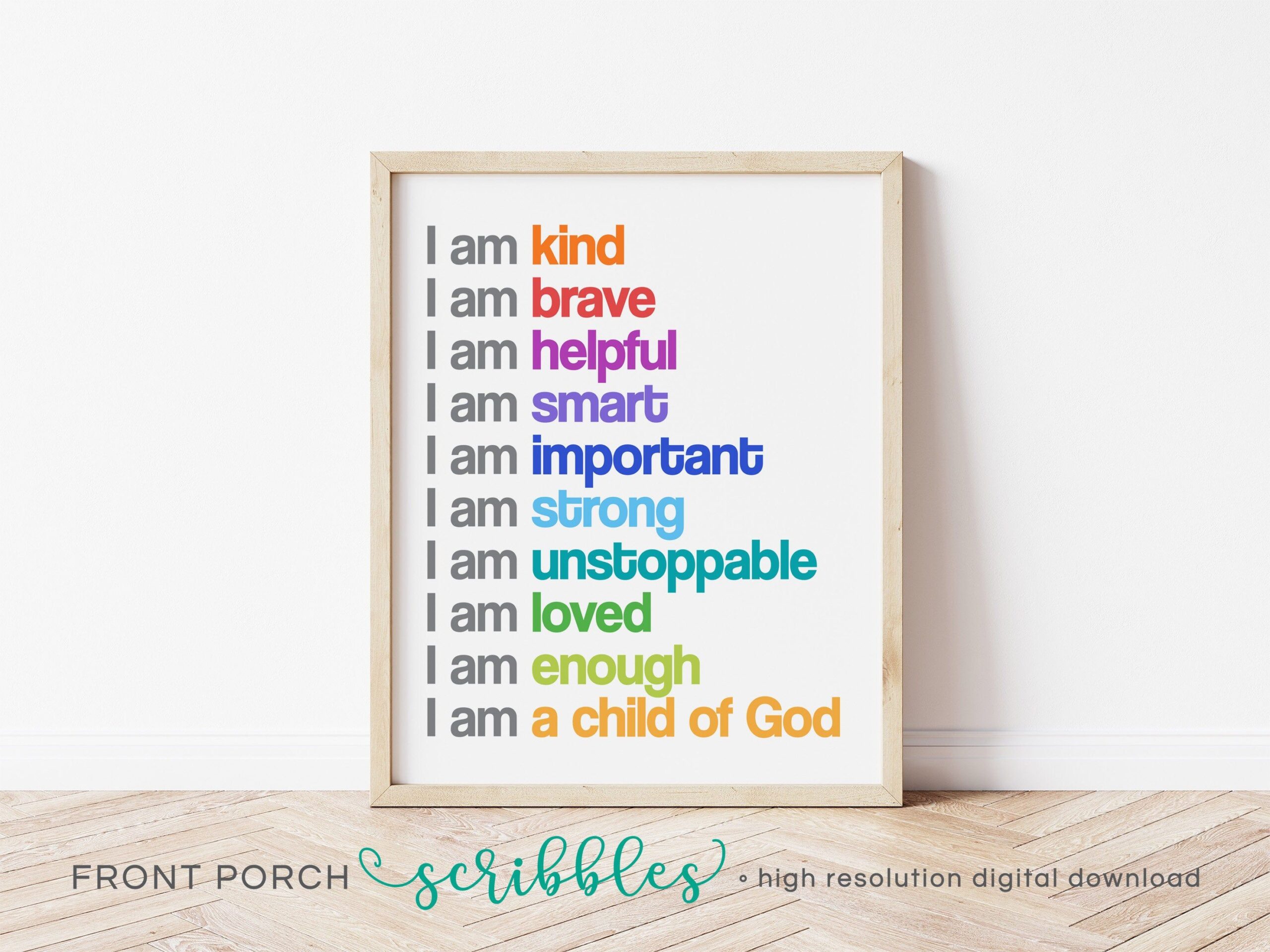
The Power of Words: Affirmations for Kids to Build Confidence and Resilience
In a world that often emphasizes achievement and external validation, it’s crucial to equip children with the inner strength to navigate challenges and believe in themselves. One powerful tool for fostering this self-belief is the use of words of affirmation for kids. Positive affirmations, when used consistently and sincerely, can significantly impact a child’s self-esteem, resilience, and overall well-being. This article explores the benefits of words of affirmation for kids, provides practical examples, and offers guidance on how to effectively incorporate them into a child’s daily life.
Why Words of Affirmation Matter for Children
Children are highly impressionable, and the messages they receive, both positive and negative, shape their self-perception. While external praise and encouragement are valuable, internalizing positive beliefs about themselves is even more critical. Words of affirmation for kids serve as a powerful tool for building this internal foundation of self-worth. Here’s why they matter:
- Boost Self-Esteem: Regularly hearing positive statements about their abilities and worth helps children develop a strong sense of self-esteem.
- Promote Resilience: Affirmations can help children bounce back from setbacks by reminding them of their strengths and capabilities.
- Encourage Positive Thinking: Consistent exposure to positive affirmations can shift a child’s mindset towards optimism and self-belief.
- Strengthen Emotional Intelligence: Affirmations can help children identify and express their emotions in a healthy way.
- Improve Focus and Concentration: By reducing self-doubt and anxiety, affirmations can help children focus better on tasks and learning.
Examples of Powerful Words of Affirmation for Kids
The key to effective affirmations is to make them specific, personal, and genuine. Here are some examples of words of affirmation for kids, categorized by the areas they address:
Affirmations for Self-Esteem and Worth
- “I am loved and appreciated.”
- “I am a valuable person.”
- “I am proud of who I am.”
- “I am kind and compassionate.”
- “I am unique and special.”
Affirmations for Confidence and Ability
- “I am capable of learning and growing.”
- “I can achieve my goals.”
- “I am good at [specific skill or activity].”
- “I am brave and strong.”
- “I believe in myself.”
Affirmations for Resilience and Coping
- “I can handle challenges.”
- “I am resilient and can bounce back from setbacks.”
- “I can learn from my mistakes.”
- “I am in control of my emotions.”
- “I am safe and secure.”
Affirmations for Kindness and Empathy
- “I am a good friend.”
- “I am helpful and kind to others.”
- “I care about other people’s feelings.”
- “I am a good listener.”
- “I treat others with respect.”
How to Use Words of Affirmation Effectively
Simply reciting words of affirmation for kids isn’t enough. To truly make an impact, consider these tips:
- Make it Personal: Tailor the affirmations to the child’s specific needs and strengths. What areas are they struggling with? What qualities do you want to reinforce?
- Be Genuine: Children can detect insincerity. Affirmations should be heartfelt and based on real qualities you admire in them.
- Be Consistent: Incorporate affirmations into their daily routine. This could be during breakfast, bedtime, or before a challenging activity.
- Use Visual Cues: Write affirmations on sticky notes and place them around the house, such as on the bathroom mirror or refrigerator.
- Make it a Habit: Encourage the child to repeat the affirmations themselves, either aloud or silently.
- Lead by Example: Share your own affirmations with your child. This shows them the value of positive self-talk.
- Acknowledge and Validate Feelings: Affirmations are not meant to dismiss or invalidate difficult emotions. Instead, they should be used in conjunction with acknowledging and validating those feelings. For example, you could say, “I know you’re feeling frustrated right now, but I believe you can figure this out.”
- Focus on Effort and Process: Praise effort and progress, not just outcomes. This helps children develop a growth mindset and encourages them to persevere even when things are difficult. Affirmations like “I appreciate how hard you’re working on this” or “I see how much you’ve improved” are more effective than simply saying “You’re so smart.”
Age-Appropriate Affirmations
The language and complexity of affirmations should be tailored to the child’s age and developmental level. Here are some examples of how to adapt affirmations for different age groups:
Preschoolers (Ages 3-5)
Use simple, concrete language and focus on basic concepts like love, safety, and belonging. For example:
- “I am loved.”
- “I am safe.”
- “I am happy.”
- “I am a good helper.”
- “I am strong.”
Elementary School Children (Ages 6-11)
Introduce more complex concepts like confidence, resilience, and kindness. For example:
- “I am confident in my abilities.”
- “I can handle challenges.”
- “I am a good friend.”
- “I am a good learner.”
- “I am proud of myself.”
Teenagers (Ages 12-18)
Focus on identity, purpose, and self-acceptance. For example:
- “I am discovering who I am.”
- “I am capable of achieving my dreams.”
- “I accept myself for who I am.”
- “I am worthy of love and respect.”
- “I am making a positive impact on the world.”
Addressing Common Concerns
Some parents may be hesitant to use affirmations, fearing that they will create unrealistic expectations or inflate a child’s ego. However, when used appropriately, words of affirmation for kids are not about creating a false sense of perfection. Instead, they are about fostering self-belief, resilience, and a positive mindset.
Here are some common concerns and how to address them:
- Concern: Affirmations will make my child arrogant.
Response: Focus on affirming effort, character, and values, rather than simply praising achievements. Teach humility and empathy alongside self-belief. - Concern: Affirmations will create unrealistic expectations.
Response: Acknowledge that challenges and setbacks are a normal part of life. Use affirmations to help children cope with difficulties and learn from their mistakes. - Concern: Affirmations are just empty words.
Response: Make sure the affirmations are genuine and based on real qualities you admire in your child. Use them in conjunction with other forms of support and encouragement.
Beyond Words: Creating a Supportive Environment
While words of affirmation for kids are a powerful tool, they are most effective when combined with a supportive and nurturing environment. This includes:
- Unconditional Love and Acceptance: Let your child know that you love and accept them for who they are, regardless of their achievements or mistakes.
- Active Listening: Take the time to listen to your child’s thoughts and feelings without judgment.
- Quality Time: Spend quality time with your child, engaging in activities they enjoy.
- Positive Role Modeling: Model positive self-talk and healthy coping mechanisms.
- Encouragement and Support: Encourage your child to pursue their interests and passions, and provide them with the support they need to succeed.
Conclusion
Words of affirmation for kids are a simple yet powerful tool for building self-esteem, resilience, and a positive mindset. By incorporating affirmations into a child’s daily life, parents and caregivers can help them develop a strong sense of self-worth and the confidence to navigate the challenges of life. Remember to make the affirmations personal, genuine, and consistent, and to combine them with a supportive and nurturing environment. Investing in a child’s self-belief is one of the greatest gifts you can give them, setting them up for a lifetime of success and happiness. [See also: Raising Confident Children] Remember, the power of positive words of affirmation for kids can make a world of difference.

